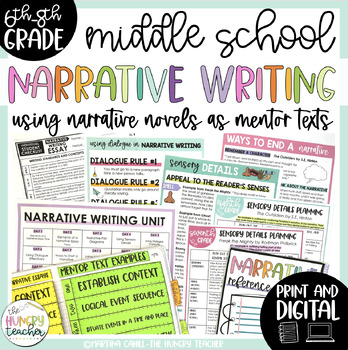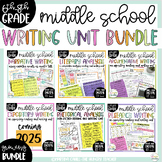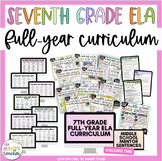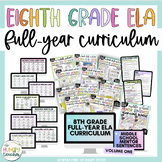Middle School Narrative Essays Writing Unit Activities 6th 7th 8th Grade Essays
- Zip
What educators are saying
Also included in
- Teach all the middle school ELA writing standards and concepts with this differentiated print and digital 6th, 7th, and 8th grade writing units. This growing bundle currently has narrative writing, literary analysis, argumentative, and rhetorical analysis writing units. A research writing unit and aPrice $99.00Original Price $143.95Save $44.95
- Teaching all the Middle School ELA for 6th, 7th, and 8th grade Literature, Informational, Grammar, and Writing standards is completely broken down and done for you with this complete ELA curriculum bundle of units. This bundle includes all of my literary devices units, my nonfiction unit, all of myPrice $499.99Original Price $997.00Save $497.01
- Teaching all the sixth-grade middle school ELA Literature, Informational, Grammar, and Writing standards is completely broken down and done for you. Your entire year of eighth-grade reading, writing, and grammar curriculum is complete with this mentor text bundle of units. This ELA curriculum bundlePrice $297.00Original Price $481.28Save $184.28
- Teaching all the seventh-grade middle school ELA Literature, Informational, Grammar, and Writing standards is completely broken down and done for you. Your entire year of eighth-grade reading, writing, and grammar curriculum is complete with this mentor text bundle of units. This ELA curriculum bundPrice $297.00Original Price $452.30Save $155.30
- Teaching all the eighth-grade middle school ELA Literature, Informational, Grammar, and Writing standards is completely broken down and done for you. Your entire year of eighth-grade reading, writing, and grammar curriculum is complete with this mentor text bundle of units. This ELA curriculum bundlPrice $297.00Original Price $451.80Save $154.80
Description
This narrative writing unit includes three weeks of middle school narrative essay writing lesson plans for teaching your sixth, seventh, and eighth grade ELA students how to write narrative essays. The mentor texts Ghost, Freak the Mighty, and The Outsiders are used as examples for each lesson.
The lessons teach all the elements of narrative writing through the use of mentor texts you and students will love using, leading them to write their narratives.
Each lesson is broken down step-by-step for teachers, and each example is broken down with explanations for students.
All the lessons include students' work examples and chart papers for 6th, 7th, and 8th grade. If you teach all three grades, the units have been differentiated, so you could teach this all three years.
Our examples are based on writing from a different character's point of view from Ghost or Freak the Mighty or continuing the narrative from The Outsiders, but all serve as good examples for any texts you or your students use. If nothing else, the examples from this writing unit serve as their mentor texts for you and your students to use.
There are 13 lesson plans and 15 sessions of narrative writing included in this resource:
- Session 1: Elements of Narrative Essays Part one
- Session 2: Elements of Narrative Essays Part Two
- Session 3: Narrative Plot Diagrams
- Session 4: Using Sensory Details
- Session 5: Using Dialogue Correctly
- Session 6: Using Dialogue Effectively
- Session 7: Ways to Start a Narrative, Writing Rough Drafts, Writing Conferences
- Session 8: Using Narrative Transitions, Writing Rough Drafts, Writing Conferences
- Session 9: Pacing Narrative Writing, Writing Rough Drafts, Writing Conferences
- Session 10: Ways to End a Narrative, Writing Rough Drafts, Writing Conferences
- Session 11: Consistent Verb Tenses, Peer Editing, Writing Conferences
- Session 12: Editing vs. Revising Rough drafts, Writing Conferences
- Session 13-15: Publishing final drafts, Writing Conferences
Other Resources Included:
- Unique examples and notes using different mentor texts for each grade level: Sixth Grade: Ghost by Jason Reynolds; Seventh Grade: Freak the Mighty by Rodman Philbrick; Eighth Grade: The Outsiders by S.E. Hinton
- Interactive Notebook Lesson for Narrative Elements and Dialogue
- Lesson Plan Slides to Teach Each Concept
- Mentor Texts Lesson, Examples, and Assessment for Dialogue in Narratives
- Editable peer editing checklist and forms
- Editable Narrative Writing Rubrics and Checklists
- Individual student writing conference forms and examples
- Examples of chart papers for every lesson
Ten Different Narrative Reference pages for students to use while writing or to make into a narrative reference booklet:
- Six elements of quality narrative essays
- Developing narrative plots
- Examples of sensory details in narrative mentor texts
- How and why to use dialogue in narrative essays
- Ways to start a narrative
- When to use transitions and lists of transition words or phrases
- Pacing narrative stories
- Ways to end a narrative
- Editing vs. Revising
- MLA Formatting of Essays
Your students will write narratives that you will LOVE reading year after year.
Prep is quick and easy... Just print the student pages, gather the materials listed, display my examples, teach the lesson, and you're ready for middle schoolers who can critically read and annotate speeches and essays and then write true rhetorical analysis responses and essays.
TEACHERS LIKE YOU SAID…
⭐️⭐️⭐️⭐️⭐️ Samantha S. says, "This resource has made teaching narrative writing to my 7th graders a breeze! I love how each day is laid out and set up so students learn a little bit about narrative writing and build their own narratives step-by-step. I made a couple of changes to some of the mentor text examples, as I am using this in conjunction with literature circle novels and I wanted it to match what my students are currently reading. Overall, I have felt so organized using this, and most importantly, my students have been engaged! "
⭐️⭐️⭐️⭐️⭐️ Amy G. says, "SUCH a valuable resource! There's so much here, and it's all appropriate for my state's learning targets. Many of my students wrote really impressive narratives, thanks to the help of this resource!"
⭐️⭐️⭐️⭐️⭐️ Frances C. says, "I love using this with my 7th and 8th graders. It really helps break it down for the students. I also love the amount of modeling she does for her students."
___________________________________
You may also like…
→ Research Essay Writing Unit for Middle School ELA
→ Argumentative and Research Writing Unit for Middle School ELA
→ Literary Analysis Reading and Essay Writing Unit for Middle School ELA
→ Rhetorical Analysis Reading Essay Writing Unit for Middle School ELA
___________________________________
Copyright © The Hungry Teacher, LLC.
Permission to copy for single classroom use only.
Please purchase additional licenses if you intend to share this product.










